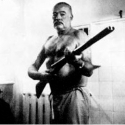|
zonohedron posted:Okay. What's a 'discipleship program'? Is it a Bible study? (perhaps one that progresses in complexity?) Is it a community service program? Is it where the church gets new musicians or ushers? I don't think I have any Catholic referent for it.
|
|
|
|

|
| # ? May 11, 2024 14:54 |
|
zonohedron posted:Okay. What's a 'discipleship program'? Is it a Bible study? (perhaps one that progresses in complexity?) Is it a community service program? Is it where the church gets new musicians or ushers? I don't think I have any Catholic referent for it. Usually baptism is immediately recommended as a symbolic representation of their newfound faith, but they are encouraged not to join the church until they know enough to decide if they want to stay there or find a place more suitable for them. They're encouraged to participate in church activities like choir, help with maintaining the facilities, seeing to the social and transportation needs of infirm members, or other activities that get them around other Christians more. It could even be recreational activities like a bowling night or everyone going out to eat together. Optimally it's an opportunity to familiarize them with doctrine and make them feel comfortable with other Christians on an equal level, some of whom might have been Christians much longer. But probably most of the time is goes awry. Discipleship is code for an overly narrow regimen of church doctrine, without any respect [or sometimes overt hostility] to the greater Christian community, or it doesn't happen at all and the new Christian wallows in obscurity in the Church and flounders in their spiritual life.
|
|
|
|
I wish my church did bowling nights e: actually playing pool would be even better, I haven't played in ages
|
|
|
|
System Metternich posted:I wish my church did bowling nights There should be Mario Kart after mass. It is easier to evade the blue shell than for a rich man to enter the kingdom of heaven.
|
|
|
|
|
|
|
|
P-Mack posted:There should be Mario Kart after mass. Does this mean purposefully flinging yourself off Jaramin posted:My denomination considers Christianity contingent solely on individual faith, so if someone converts they might not have any idea what the particular details of our faith are beyond salvation. Since converts often have no real familiarity besides passing knowledge of who some of the major characters in the Bible are, when church meets, etc., before they want to join the church they can be walked through the basics of [our] Christian doctrine, given scriptural instruction, look through the church constitution and so on. In a sense it's like a backwards version of Chatechumanization? How... how does someone convert before knowing what they're converting to? I'm not trying to be dense - someone discovers(?) or declares(?) or decides(?) they have faith in Christ, but rather than say "all right, this is what we teach, does this sound like beliefs you can accept?", your church says, "Okay, welcome to the church, here's what you've been saying you believe by saying you're a member of our church"?
|
|
|
|
You declare your faith in Jesus Christ in prayer, this is being saved Doctrine doesn't supersede personal faith
|
|
|
|
zonohedron posted:How... how does someone convert before knowing what they're converting to? I'm not trying to be dense - someone discovers(?) or declares(?) or decides(?) they have faith in Christ, but rather than say "all right, this is what we teach, does this sound like beliefs you can accept?", your church says, "Okay, welcome to the church, here's what you've been saying you believe by saying you're a member of our church"? I think Jaramin just worded their post a bit loosely. My understanding of how most churches do believer baptism is that you have to sit down with a pastor and have a chat first. It's not like you can just waltz in to a random Baptist church on Sunday, put on the wetsuit, and get dunked with no questions asked. It isn't as big of a process as Confirmation, but there are still some guidelines and rules to be followed.
|
|
|
|
zonohedron posted:How... how does someone convert before knowing what they're converting to? I'm not trying to be dense - someone discovers(?) or declares(?) or decides(?) they have faith in Christ, but rather than say "all right, this is what we teach, does this sound like beliefs you can accept?", your church says, "Okay, welcome to the church, here's what you've been saying you believe by saying you're a member of our church"? Conversion means genuinely accepting your status as a sinner and recognizing that Jesus Christ died to ensure that, upon request, your sins can be forgiven and you will go to Heaven. Even that part is a little fuzzy when it comes to those who've never heard or had the opportunity to hear the gospel. To us, that's all there is to going to Heaven and being a Christian, no other information or action required. Salvation is entirely binary, and once saved you are a member of the capital-C Church, which includes all persons who have accepted the above statement no matter their personal circumstances. Membership into a particular small-c church is entirely separate and simply means the congregation you attend regularly. Baptism is reserved to believers, and congregational membership is generally reserved to those who profess salvation and baptism. Since that's potentially the only information a new convert might have, they might be totally ignorant of how we handle communion, or what Jesus taught about the poor, the trinitarian nature of God, or how he instructed us to demonstrate our faith in our everyday lives. As a congregation, it's our responsibility to teach them those things if they're interested. If they are saved then their salvation is ensured, but it's in the best interest of them as new believers to learn the tenants that we follow. They're also encouraged to independently study and learn for themselves, but we offer the resources for them to ask questions and get more specificity on the doctrine we hold to. If they choose another congregation, or they don't like what we say, that's fine. They're welcome to choose their own path. Even if they never attend a service again or practice their faith in any way if they genuinely experienced salvation then they're going to Heaven. In that case it would be a real shame, since they are certainly missing opportunities to perfect themselves, and serve as an example of Christlike behavior to others. This is one of the reasons various strains of Protestant split like mad. No two congregations will ever agree on everything, and when I'm looking for a new church the first thing I do is ask if they have an explicit statement of beliefs, or a church constitution that I can see to see if they're compatible with what I believe. Jaramin fucked around with this message at 01:42 on Nov 8, 2016 |
|
|
|
Discipleship programs is something I an interested in crowd source thoughts for! My discernment committee asked me something like, "How would the church be better with you working here?" It was specifically about my ministry formation year, and what I would do were I given leave to change things around a bit. My immediate answer was more classes about churchy stuff-- icons, Mary, Bible study, liturgy, Greek, etc. And some fine arts stuff. We have icons, we cross ourselves, we say the Angelus, but no one knows why. They do it because they are dutiful and they trust the church (she is trustworthy) but the committee seemed to really receive that idea well. So, you know, I'm thinking more about what I would do. Formation. What's in a formation program in a local parish? I can teach things, or find teachers, but that seems really one sided. Thoughts?
|
|
|
|
Lutha Mahtin posted:I think Jaramin just worded their post a bit loosely. My understanding of how most churches do believer baptism is that you have to sit down with a pastor and have a chat first. It's not like you can just waltz in to a random Baptist church on Sunday, put on the wetsuit, and get dunked with no questions asked. It isn't as big of a process as Confirmation, but there are still some guidelines and rules to be followed. At the evangelical churches I've been to, baptism is non-essential, it's accepting Jesus into your heart that actually matters I remember hearing a sermon about a woman who had been baptized and worked very hard in ministry but was still not a true Christian because she hadn't gone down Romans Road
|
|
|
|
what's roman's road
|
|
|
|
Mo Tzu posted:what's roman's road St. Paul, Romans, ESV posted:Romans 3:23: "for all have sinned and fall short of the glory of God" trap sprung, I guess. Anyway it's basically: 1. realize you are dead in your sins 2. accept Christ who died for the sins of the whole world, including you 3. if you accept and confess Christ with your lips, heaven is yours WerrWaaa posted:Discipleship programs is something I an interested in crowd source thoughts for! My discernment committee asked me something like, "How would the church be better with you working here?" It was specifically about my ministry formation year, and what I would do were I given leave to change things around a bit. This is interesting because I'm in constant talks with the faith formation director at my parish to see what the heck we can do to keep Catholics in the faith. Like, I think according to the most recent stats I can find, about 33% of Catholics in the US believe in transubstantiation and that correlates with the number of Catholics that actually bother going to church every Sunday. So, rather than converting all the Protestants it's probably more useful to get the cradle Catholics coming back to Mass again. How would that be best accomplished? Who knows. I know there's a serious problem with catechesis in the Church currently, which is why I hope to be a catechist in a couple years, but I think it goes deeper than that. The 18-29 age cohort essentially has disappeared from churches that aren't non-denominational. Why? Small groups, Bible studies, singles ministries, etc. that allow people in that age group to connect with each other. There's absolutely nothing in my diocese like that (well we have something for young married couples to get together and also a study on the ultimate thread favorite, Theology of the Body, but that's literally it.) So ultimately I'd just copy what the evangelicals are doing without losing Catholicity, if that makes any sense.
|
|
|
|
It's fun y you say that since I go to a super active college church
|
|
|
|
Yeah I want a religious education job at a parish specifically because I had so many Catholic classmates who didn't know what the Church taught not because they didn't care but because no one taught them. It shouldn't be that me, a person who was one year into their Theology and Religious Studies major plus RCIA happening at the same time, was profoundly more educated in the Faith than people who literally went to Catholic school their whole life. They weren't even taught how to further educate themselves.
Thirteen Orphans fucked around with this message at 04:56 on Nov 8, 2016 |
|
|
|
It looks like a series of verses taken from Romans that outline the "steps" to protestant-style salvation. they're not actually in any real order so it seems to be just pulled together out of convenience
|
|
|
|
Worthleast posted:I've seen it in Minnesota, but this area is very heavily German. http://www.roadsideamerica.com/tip/9448
|
|
|
|
Today I felt bad for going to a church that is not that of my parish (I live right on the edge of my rightful parish, but attend a different-language mass than my home parish offers) but the one where I have served as an altar boy, reader, sang in the choir, and felt a member of for more than a decade. We're all Catholic, darn it! I'm nothing but a hardware store clerk! I'm not supposed to feel bad if I don't recognise the priest of the parish next door! I still feel bad though.
|
|
|
|
We're all catholic
|
|
|
|
Lutha Mahtin posted:We're all catholic Luther Martin shitposting continues to deliver, much as in the historical Reformation Worthleast posted:I've seen it in Minnesota, but this area is very heavily German. Is your area really Catholic? My experience of the upper Midwest (here I'm thinking Minnesota, Wisconsin, northern Iowa, eastern Dakotas) is super Lutheran or generic Protestant and Scandinavian or German ethnically, with a strong language and cultural tradition disappearing for fairly obvious reasons during WW1 and WW2. At one point my family was Catholic and then there was some drama over remarriage and my great-grandfather (and one sibling) ran away, it's pretty murky. I guess it would make sense if there were some strongly Catholic pockets in the region. The ELCA college I attended had a student body that was about one-third Catholic. I just haven't been exposed to them I guess. Pellisworth fucked around with this message at 14:37 on Nov 8, 2016 |
|
|
|
Pellisworth posted:I guess it would make sense if there were some strongly Catholic pockets in the region. The ELCA college I attended had a student body that was about one-third Catholic. I just haven't been exposed to them I guess.
|
|
|
|
HEY GAL posted:but were they just as Nordic/German as the rest of you up there? Yeah, there wasn't any noticeable ethnic divide. Towns were maybe 20-30% Catholic and there wasn't any particular pattern to it other than families of Scandinavian ancestry were usually Protestant and German and Anglo families were a mix which makes sense. Off the top of my head, local families and denominations (please don't be a doxxing fuckhead): Protestant: Baker, Assman, Klein, Larson, Olsen, Jansen, Chauncey, Bachelor, Anderson, Tate, Harp, Koschitzke, Farnsworth Catholic: Krogman, Grimshaw, Moosman, Graham, Havemann, Lamboureaux, Bordeaux, Colombe So it's a pretty mixed assortment of German, Scandinavian, Anglo, and French-Indian (the last three Catholic surnames being Native American families). Maybe it was different for other Midwesterners (Lutha Mahtin, Worthleast, Jedi Knight Luigi, others?) but I never felt religion was remotely a social dividing line. I mean, Catholics were sort of their own thing but it wasn't significant. Edit: it's probably a more significant factor in cities large enough to have private Catholic schools, probably 20k or more population. Virtually every decent-size American city has a private Catholic school system but in the rural environment I grew up in there wasn't really a Protestant/Catholic divide. Pellisworth fucked around with this message at 15:41 on Nov 8, 2016 |
|
|
|
well, the mixed native/french people being catholic makes a lot of sense what would be really interesting is if Metternich recognizes the names of your catholic german-americans as being common catholic german names
|
|
|
|
HEY GAL posted:well, the mixed native/french people being catholic makes a lot of sense Yeah I mean it was part of the Louisiana Purchase so it was colonized by French traders a century or more before being bought and conquered by the US. There is an ethnic slur in Lakota which is something like wiyeska but I've never heard it myself, it translates literally as "translator" and refers to a mixed-race Native American person. The French intentionally married Native wives so their children would be bilingual and thus better able to communicate and make megabucks with the locals. The Germans in the area, including my family, were mostly Russian (Volga) Germans and I don't know their history well, though there's a book floating around somewhere by the Wentzlaff family. The story goes they were invited to settle in the Volga region of Russia by Catherine the Great to teach modern agricultural techniques to the locals, with guarantees about religious freedom and being excepted from conscription. Their guaranteed freedoms didn't last long and they got the gently caress out of Russia, mostly through the port of Odessa on the Black Sea. They mainly settled in Minnesota and the Dakotas, they were experienced in dryland agriculture and many of them homesteaded on the American Plains starting in the 1860s. There was a very strong German and Scandinavian language and cultural tradition up until the early 1900s when it disappeared as a result of the World Wars against Germany. Pellisworth fucked around with this message at 15:42 on Nov 8, 2016 |
|
|
|
Lutha Mahtin posted:We're all catholic Our hymnal has an asterisk next to "holy catholic church" in the Apostle's Creed, making sure we understand that it simply means "universal" and has nothing to do with the Roman Catholic Church. Always makes me giggle.
|
|
|
|
Deteriorata posted:Our hymnal has an asterisk next to "holy catholic church" in the Apostle's Creed, making sure we understand that it simply means "universal" and has nothing to do with the Roman Catholic Church. haha yep, every Protestant hymnal that I can recall has this-- Episcopal, Methodist, Lutheran. It's a beautifully passive-aggressive middle finger to the corrupt papists
|
|
|
|
HEY GAL posted:well, the mixed native/french people being catholic makes a lot of sense It's all over the place. Bäcker (= Baker) is common throughout Germany, though the varieties “Böck“ and “Beck“ are more frequent in Bavaria/Austria, I believe. The names ending in -son and -sen are northern Germany/Scandinavian af. The -mann names are more western/northern German with the exception of Moosmann, which is mainly found in the southwest. No clearly Austro-Bavarian names (which are afaik the only names to be more or less consistently Catholic, though I only know little about Rhineland Catholic names), and the others are either from clearly Protestant or mixed-denomination areas e: this is interesting since the Volga Germans came mostly from Bavaria, Baden, Hesse, the Palatinate and the Rhineland which as far as I can see doesn't exactly map to the names System Metternich fucked around with this message at 16:02 on Nov 8, 2016 |
|
|
|
Commie NedFlanders posted:so for the longest time i never understood what the deal was with Jews and Christians I mean, by the time you're reading John it's pretty obvious how gentile converts could come to despise Jews.
|
|
|
|
Deteriorata posted:Our hymnal has an asterisk next to "holy catholic church" in the Apostle's Creed, making sure we understand that it simply means "universal" and has nothing to do with the Roman Catholic Church. Pellisworth posted:haha yep, every Protestant hymnal that I can recall has this-- Episcopal, Methodist, Lutheran. gently caress that poo poo. The Church of England in South Africa (small schismatic group, not the Anglican Church of Southern Africa) dropped the word catholic from their creeds, because some stupid local pissing contest with the Tractarians was worth rewriting the whole underpinnings of the faith for.
|
|
|
|
Mr Enderby posted:gently caress that poo poo. Think of all the exciting varieties of early heretical Christianity you guys could start believing if you are free to edit the creed. "We believe in two gods, one of the Old Testament, and one of the New..."
|
|
|
|
Pellisworth posted:
Yeah this is accurate for Wisconsin. I was friends with a Catholic family and thought it was weird that they could take communion from 5th grade on, but something like that isn't gonna keep us from playing mario golf together or whatever. Probably half the last names in a given Lutheran congregation in southeastern Wisconsin start with Sch (including my own). We're basically all Prussians who came over in the 1870s. E: I went to Lutheran boarding school for high school (also located in southern WI) and we literally had both a Bitter and a Sauer in our class. Jedi Knight Luigi fucked around with this message at 16:12 on Nov 8, 2016 |
|
|
|
RICHUNCLEPENNYBAGS posted:Think of all the exciting varieties of early heretical Christianity you guys could start believing if you are free to edit the creed. "We believe in two gods, one of the Old Testament, and one of the New..." Come to think, why don't they revive heresies? Surely there should be people interested in, dunno, Cathars or Arianism today!
|
|
|
|
JcDent posted:Come to think, why don't they revive heresies? Surely there should be people interested in, dunno, Cathars or Arianism today! There are organised Arian churches. And I don't mean Jehova Witnesses, but things like that: http://www.arian-catholic.org/ It may not look like much, but they have parishes even in Russia. Note also that the background on this website is stolen from the official site of the Holy See. http://w2.vatican.va/content/francesco/en.html
|
|
|
|
Pellisworth posted:Luther Martin shitposting continues to deliver, much as in the historical Reformation I'm a transplant, but the whole area around St. Cloud and Collegeville is super Catholic with some rad old churches. Like every little town has this gigantic German Catholic church, and some have a Polish one too for good measure.
|
|
|
|
JcDent posted:Come to think, why don't they revive heresies? Surely there should be people interested in, dunno, Cathars or Arianism today! There are plenty of Arianists: the largest group is headquartered in Salt Lake City. Neo-Calvinists who believe in the eternal subordination of the Son are, I would argue, also Arianists, since they implicitly deny the unity of the Divine Will. Arianism turns up a lot because it offers a simplification of one of the greatest and most difficult Mysteries.
|
|
|
|
Okay first of all thank you all for the copypastas on the last page, the Chronicles of Riddick and Navy SEAL copypastas are some of my favorite Internet bits of all time, and the tulpa one is okay except I find that whole thing obnoxious because it's a Tibetan word and  But anyhow: Hesychasts: Orthodox yogis?
|
|
|
|
Paladinus posted:There are organised Arian churches. And I don't mean Jehova Witnesses, but things like that: quote:The true Universal Christian Church is Anglican. A simple fact is that although it is believed Jesus Christ travelled to different countries, there is powerful evidence that he spent most of his life in England (see Christ in Britain). After Jesus’ death, his uncle, St Joseph of Arimathea, returned to Glastonbury with St Simon and erected the first Christian church there (see First Christian Church in Britain). In fact there is no logical reason why the Universal Church should be run from Rome other than Rome being the centre of power and wealth during the time of the Roman Empire. Logic would suggest that there are two original Holy centres for Christianity in the world: Jerusalem in Palestine/Israel and Glastonbury in England; arguably Rome is a third centre due to centuries of prayer and worship that have been concentrated there. The Arian Catholic Church is the evolved form of the early Church and is the true Anglican, Global and true Universal (Catholic) Christian church, that is not tethered to Rome. drat, not even heresies are safe from being appropriated by Anglos
|
|
|
|
Bel_Canto posted:There are plenty of Arianists: the largest group is headquartered in Salt Lake City. Neo-Calvinists who believe in the eternal subordination of the Son are, I would argue, also Arianists, since they implicitly deny the unity of the Divine Will. Arianism turns up a lot because it offers a simplification of one of the greatest and most difficult Mysteries. There's been a *lot* of pushback against eternal subordination of the Son to the Father in Reformed circles recently. I think the recent controversy with the new ESV edition, where CrossWay decided to mangle Genesis 3:16 into saying something completely different to advance a complementarian/eternal subordination theology caused a lot of people to pay attention to what on earth was going on with complementarianism destroying the orthodox view of the Trinity. For reference, Old ESV Genesis 3:16 posted:Your desire shall be for your husband, and he shall rule over you. New ESV Genesis 3:16 posted:Your desire shall be contrary to your husband, but he shall rule over you. The issue here is that the Hebrew preposition el has a broad range of meanings. Sometimes it's used to mean "for" and sometimes it's used to mean "against" and these all occur in Genesis. There's a little bit of a semantic leap from "against" to "contrary to" and a lot of Hebrew scholars disagree with the new ESV translation of this verse. CrossWay saw an opportunity to stretch the meaning of el in order to advance their theological agenda of complementarianism and decided to go for it. But it doesn't actually stop there, because complementarianism and neo-Calvinists hacking up the coequality of the Trinity are inextricably linked. The underlying theme is that it is actually good for women to submit to their husbands much as the Son submits to the Father. Now, while I agree with economic subordination, since it is clear from scripture that the Son has both a human will and a divine will ("nevertheless not my will, but thine, be done" etc.) the neo-Calvinists who subscribe to this theology are arguing for an ontological subordination; that is, the Son, by His very nature, is always in a position of eternal submission to the Father. This, actually, is kind of a big heresy, and it was all done because of gender politics.
|
|
|
|
Bel_Canto posted:There are plenty of Arianists: the largest group is headquartered in Salt Lake City. Neo-Calvinists who believe in the eternal subordination of the Son are, I would argue, also Arianists, since they implicitly deny the unity of the Divine Will. i have read a baptist or two who got mad as heck once they realized that was what they had been suckered into turning a blind eye to edit: beaten, but has it occured to you, The Phlegmatist, that if you read this back into the older Christianities, there's an argument in there that only women can be priests? HEY GUNS fucked around with this message at 19:25 on Nov 8, 2016 |
|
|
|

|
| # ? May 11, 2024 14:54 |
|
Paramemetic posted:Hesychasts: Orthodox yogis?
|
|
|
































